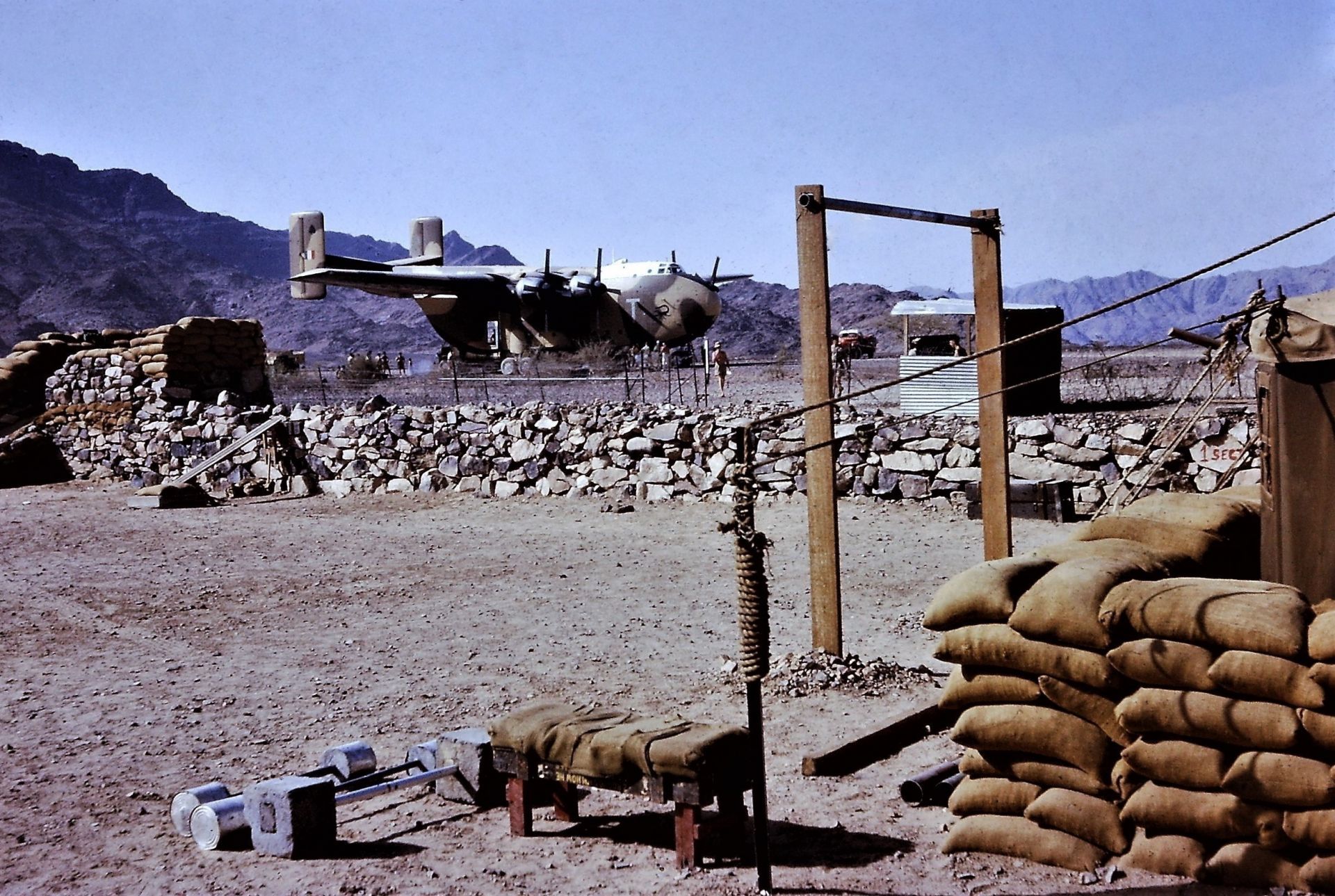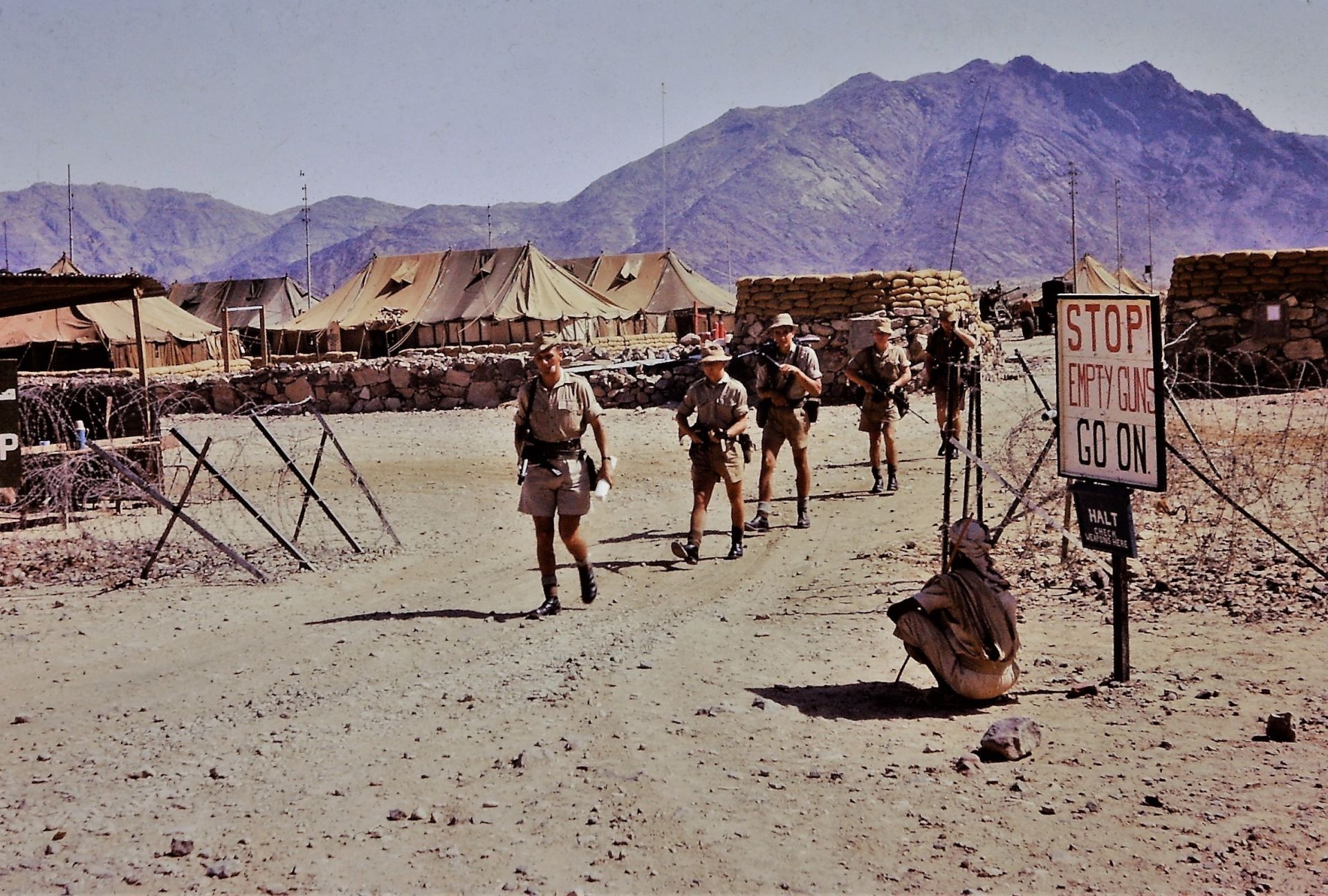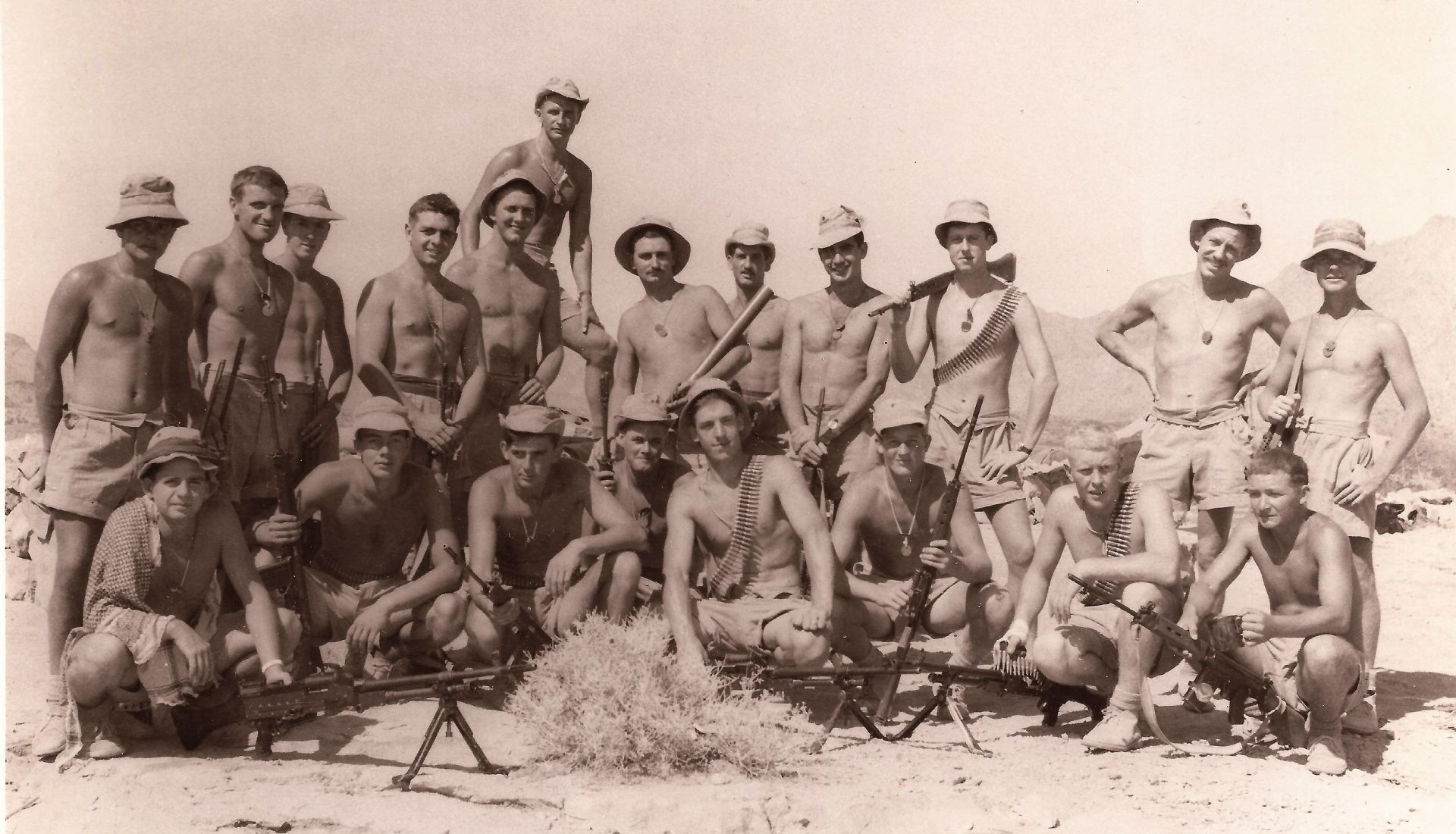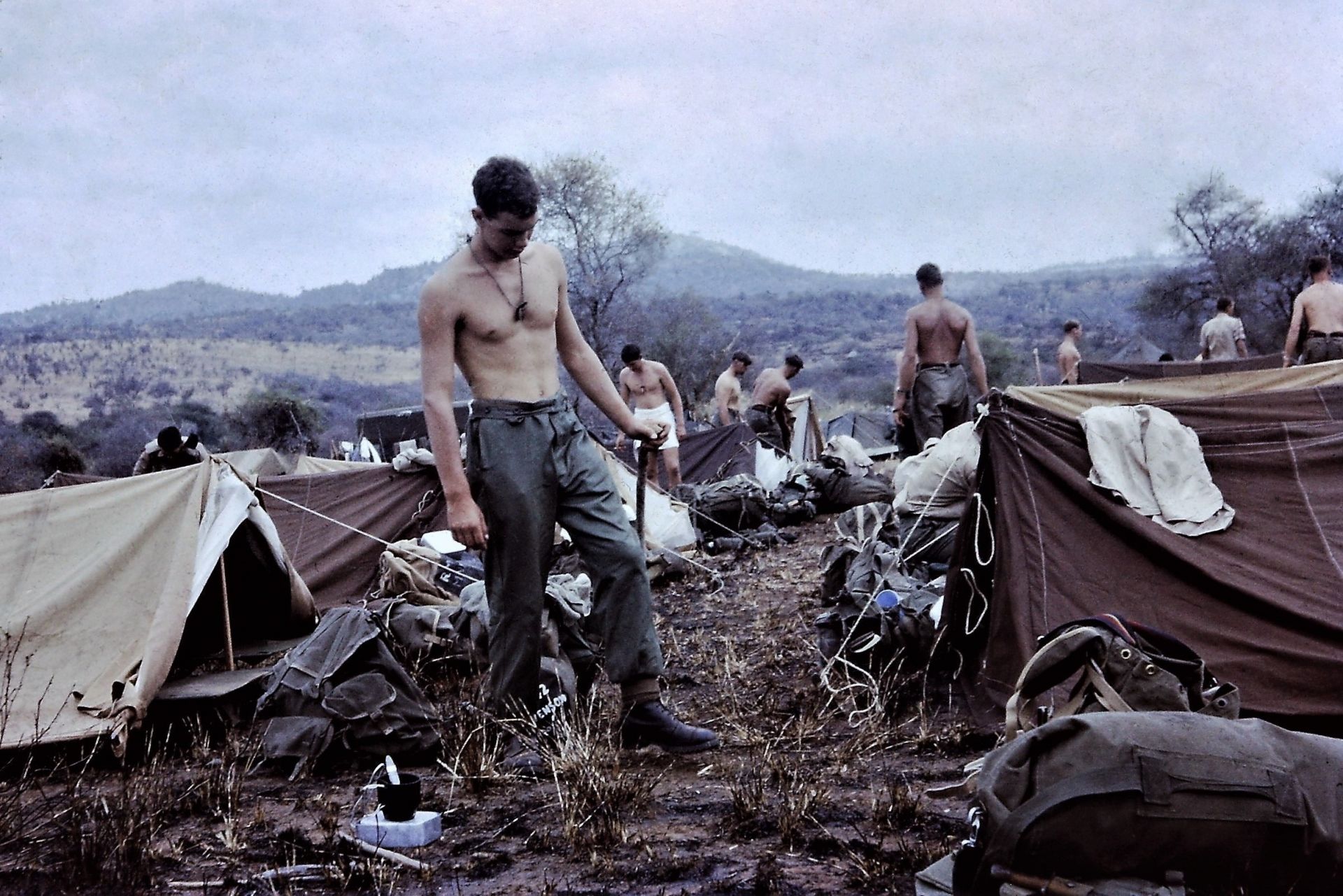
|
Active Service in Aden Aden, which in 1990 was to become part of the adjoining country Yemen, is located at the southern tip of the Arabian Peninsula and became part of the British Empire in 1839 when it was acquired by the British East India Company to enable them to protect their ships from pirates. Later, due to its port, Aden became an important stop for ships to take on coal on the Red Sea route to India. Becoming a British Protectorate in 1874, Aden remained so until 1967. As the British decolonised following World War II, Aden grew in importance due to Britain’s loss of other territories, and the fact that it was a strategically placed port. It became the headquarters for both the Colonial Office and the British military in the Middle East.
In the early 1960s, resentment grew against the British as its troops tried to put down tribal warfare, which produced resistance from Arab nationalists both inside and outside Aden. 45 Commando was first sent to Aden in 1960 and was stationed at the BP Camp in Little Aden. On December 10th, 1963, a terrorist tried to kill the British High Commissioner. A state of emergency was declared, and the British raised their efforts to retain control. I flew to Aden at the end of May 1966. The thing I remember most about my arrival was that when the plane doors opened at RAF Khormaksar, a blast of scorching heat hit me as if an oven door had just been opened. The other stand-out memory from those first hours was that everyone was carrying a weapon. I had seen it in films, but this was real, and I was to become part of it. We were quickly ushered through the reception process and onto the waiting transport. 45 Commando was based in Little Aden, which was across a causeway several miles away. On arrival, we were allocated our companies and troops. I was allocated 2 Troop, “X” Company, along with Dave Long, Pete Kelly, and Howard Marshal, my friends from training. We were briefed and then shown to our huts. The first few days were about getting acclimatised to both the heat and the political situation. We were sent on long runs and educated on what we could and couldn’t do. After that, we joined our Troop and headed off on Internal Security duties in Crater. The name Crater speaks for itself: It’s a town built in the crater of an ancient volcano. Temperatures in the summer months went over 100oF, and touching the metal of your rifle could easily result in a burn. We were housed outside of Crater and went into the town each day. Our base was the police station, from where we went out on patrol or did whatever else we were required to do, such as guards or observation posts. As for any Marine, my first patrol was memorable. Straight out of training and we came under a grenade attack. As soon as the word ‘grenade’ was shouted, the training kicked in and took over. I threw myself on the ground, as did everyone else in the patrol. After the explosion, we got up and there was a scurrying around, but it was pointless, as the person who had thrown it was long gone. The subsequent events have dimmed, although I can still see one civilian, an old man, who had been caught in the blast and lay on the ground bleeding. After several weeks in Crater, we returned to Little Aden and carried out security duties there. I established a routine and got to know the other people in my troop, who introduced me to folk music which was to become a life-long passion. It was in Aden that I was introduced to the music of Nancy Sinatra and Lee Hazelwood, Marianne Faithfull, and Joan Baez. One of the guys had a portable record player on which he played his limited selection of discs. When I returned home, I bought copies of all those records. In later years, I was to take over the running of the Turk’s Head Folk Club in Lincoln. Shortly thereafter, we were informed that our troop was going up country to a place called Wadi Ayn to cover the withdrawal of British Forces from the most remote part of the British Empire. We were expecting a rough time in Wadi Ayn but, in fact, it was the opposite and we had a great time. George Hearn, Sandy, Robbo, and me at Wadi Ayn.
The camp consisted of an airfield and everything required to maintain and defend it, including RAF and Army personnel. Our job was to cover the withdrawal. The local headman was very pro-British, and he had placed his men around our camp so that if anyone wanted to get to us, they had to go through his men first. I often wondered what happened to him after the British left Aden. During the preparation phase of the withdrawal from Wadi Ayn, our job consisted of a bit of patrolling, escorting the medic to villages, and keeping fit. The place resembled Butlins in the sun – with plenty of sun. There were also plenty of flies. We used to have competitions on the gate guard to see who could kill the most flies while sitting at the table during guard. Certainly, it was a challenge to get your food into your mouth without any flies on it.  Wadi Ayn camp. Looking out from our accommodation.
Although the camp was only a few miles from the Yemen border on three sides, we were never attacked. We had PT every day, as one of the Troop Corporals was a PT Instructor. In fact, he was at Lympstone when we were going through training. He was a big Welshman who had thrown the discus for Wales. I was straight out of training, and he took me under his wing. He taught me many tricks which would come in useful in my military life. The first thing he did whenever he got to a new camp was to take some cans of beer to the cooks and introduce himself which, along with his friendly yet notable presence, always ensured that he got plenty of food. Certainly, in my later years, I would always ensure that I had a good relationship with the cooks. In exchange for his lessons, I taught him to play the guitar. Each day we would normally take out a patrol with the medic as part of the ‘hearts and minds’ operation, endearing ourselves to the local headman and his people.  Leaving Wadi Ayn camp on patrol.
Apart from guard duties, we also had to assist with the preparation for the camp evacuation to get the stores and equipment back down country. The trip down country from Wadi Ayn was almost uneventful. We weren’t expecting any hostile problems due to the route that we were taking, which was via the Sea of Sands, a particularly desolate landscape. We did have a short patch of the trip where the ground created a problem for the vehicles to cross so they were taken across a couple at a time, roped up, with us pulling as needed. The Convoy Commander would call for the vehicles that he wanted. On one occasion, he called out, “I’ll have the Scammel and a 3 Tonna”, whereupon the sweat-soaked face of a marine looked up and enquired, “On toast, Sir?” Upon return from Wadi Ayn, volunteers were being sought for attachment to Naval Security at HMS Sheba, which was at Steamer Point (now Tawahi) in the Port of Aden. HMS Sheba was a Royal Navy shore base and was what is known as a “Stone frigate”. This is a term that originated in 1803-04 when the Royal Navy was prohibited from ruling over land, however, they needed somewhere off Martinique they could use to harass the French, so they commissioned the land as a ship. Attached to Naval Security sounds grand, but basically, we were manning the main gate and controlling access to the establishment. One of the other volunteers from my troop was George Hearn. George and I first met during training as he was in the squad behind me. In fact, if he had arrived in Deal one day earlier, we would have been in the same squad. Me on gate guard at HMS Sheba.
Although it was an important location, things at HMS Sheba were generally quiet. While I was there, I only saw two incidents. Once when George and I were on guard, he discovered a visitor with a handgun in a holster. On alerting me, I held the man and put my pistol to his head while George disarmed him. It turned out that he was an undercover policeman who had failed to identify himself prior to attempting entry. In the second incident, a grenade was thrown into the private roadway leading from the main road to the gates of the base. It was a busy time, but someone saw the grenade and gave the warning, so people were able to throw themselves onto the ground. As soon as the grenade exploded, George and I were up and running across all the people who were still laying prone on the ground in an effort to get to the incident as quickly as possible. Although the prospect of getting the person who had thrown the grenade was slim, we acted automatically, but by the time we covered the 100 or so yards, they were long gone. Fortunately, because of the warning, and people knowing the action to take, only one person was slightly injured. After a couple of months, I had to leave HMS Sheba prematurely as I had a disagreement with a very unpopular lance corporal. Our disagreement ended in more than just words, with punches being thrown. In an amazing turn of events, no charges were filed against me. While the incident happened in the mess block full of marines, it seems no one there saw me do a thing wrong. After the incident, I was returned to my unit which was upcountry in the Radfan Mountains. In a strange twist of fate, within a week I was promoted to lance corporal myself and became a section commander. Our return down country gave us a bit of time before our next hot spot, which was Sheikh Othman, where we were tasked with the provision of guards within Al Mansoura prison, which was used for the detention of political activists. While in Sheikh Othman, our patrol encountered mines and was fired upon. All in all, during my time in Aden I was grenaded, mortared, mined, and shot at. When I got home to England, if I heard a car backfire I very nearly dived onto the pavement. You still don’t find me sitting with my back to the door in cafes or restaurants. Wadi Ayn wasn’t the only place upcountry where the Marines were required to support other British troops. 45 Commando was also based for a time at Dhala Camp, which lies on a plateau at an altitude of some 5,000 feet, situated about eighty miles north of Aden, and less than ten miles from the Yemen border. The camp was supplied by the Dhala convoy, which was susceptible to attack, consequently, we set up observation posts (OPs) along the way to provide it protection. OP overlooking the road used by the Dhala convoy.
We were also involved in operations to search out terrorists, which involved tramps across the rough, barren ground, and climbing some extremely steep rock faces. Rocky terrain.
Another location upcountry where we were based was Habilayn. Habilayn was a permanent Army base. It was large enough to accommodate a force of some 600 men, who were rotated every couple of months from Aden, plus a joint Army/RAF HQ element. It was a tented encampment, surrounded by stone walls up to 3 ft high. Incoming dissident fire at night was a frequent occurrence. On one occasion while at Habilayn, our troop was told to set up camp on an exposed table-top “jebel”.  2 Troop, X Company, 45 Commando. Dave Long is standing 2nd from left, George standing 4th from left, I'm standing 4th from right.
A “jebel” is a Middle Eastern word referring to mountains. We were going to be bait. Anyone who attacked us would be ambushed by the Special Air Service (SAS), either on their way in to attack or on their way back out. We knew that we were likely to come under fire, so we really went to town making our “sangar”, which is a temporary fortified position used to provide protection from enemy fire. These can be constructed of either sandbags or stone. Ours was of thick walls of stone. We then sat back and waited. Our stone sangar.
We were there for several days but eventually, during the night of November 5th, the fireworks started. Some years later, when I was with the Territorial Army, I was talking to a guy in the SAS and the subject of Aden came up. I mentioned that we had been the bait for them once, and it turned out that he had been in that ambush group. My time in Aden wasn’t all work. In November we went to Kenya for six weeks of training. The training was split into two phases: three weeks on the plains of Hathanger and three weeks at Kathendeeny in the tropical rain forest below Mount Kenya, where we learnt to survive in the jungle. Our departure to Kenya was delayed for a couple of days for operational reasons, as the aircraft to take us there was required elsewhere. The morning we were due to leave our camp we were given the news. For me, it was exceptionally good news, as the previous evening we had been celebrating one of the guy's birthdays. I can remember the early part of the evening, but the last thing I remember was bringing a couple of gin and tonics back to our table and starting to sit down. I don’t remember actually sitting on the chair, nor do I remember anything else about the rest of the evening. The next thing I knew was waking up in bed the following morning, feeling decisively unwell, and leaning over the side of my bed. To my amazement, some thoughtful person had placed a bucket there. Forcing myself to get up, I thought that a bit of breakfast might help, so off to the cookhouse I went. I helped myself to some bacon, eggs, fried bread, and beans and sat down, cut the bacon, and realised I wasn’t going to make this. Quickly I deposited my breakfast in a bin and made my way back towards my room. Several Army personnel had been staying with us overnight and two approached me to ask where the dining room was. At that moment I could hold it down no longer and, as I was pointing to the building I’d just come out of, up came more of my previous evenings drinking remnants. I didn’t stick around to see if they decided to have breakfast or give it a miss. I’ve never touched gin since. In fact, I still can’t stand the smell of it. I can honestly say that that was the only time I have ever been in that condition. Much of the flight to Kenya is erased from my mind. I must still have been below par. When we got to Kenya, we were loaded onto three-tonners and set off to our first area at Hathanga. The trip seemed to take an eternity and eventually, we were on dust tracks and our hopes rose that we would be nearing our destination, but the tracks seemed to last an age also. When we did arrive, we found a campsite containing lines of “bivis”, which are two-man temporary shelters made of waterproof sheets secured together, which had been erected by the advance party. That day we settled in and got to know our surroundings.  Our campsite with Bivis, Hathanger, Kenya.
The next day we started our training, which involved most of the skills that we already knew. It was nice to get away from the heat and tension of Aden. It enabled me to realise the stress that we were under with the constant threat of the events there. Here we could unwind and take stock of the situation. It was then that I started to formulate my outlook on life and what I wanted out of it. I realised that you must have some idea of what you want and where you want to be if you hope to achieve it. My thoughts would stray to home, and I would compare my life to that of my friends and what they would be doing, and I would consider myself so fortunate to have the experience that I was having, and to be where I was. Sometimes I sit and think, and sometimes I just sit.
We were hoping that there might be a social element of our visit, but that wasn’t to be, as we really were out in the wilds of Africa. Our evenings consisted of gathering around the Troop campfire, telling stories, and singing songs. Whenever I hear the folk song ‘Wild Rover’, I remember those evenings. One thing that we did need to cope with was animals, ones that we didn't come across in England. Once a lion took an interest in our section but kept its distance, and there was a rhino who decided to come a little closer to get a better look at us. By the time it got close, we were up in the trees. It looked around and then moved on. We stayed up our trees for a while before deciding it was safe to venture down. After three weeks, we were to move up to the tropical rainforest of Kathendini. If you don’t like insects and creepy crawlies, don’t book a holiday there. We learnt about living and moving in jungle conditions, including how to erect our “basha” (shelter) on a platform so that we were not sleeping on the ground. One guy left his pack underneath his basha and the next morning his food had gone, and it wasn’t any of us that took it. The thing that sticks in my memory the most, occurred when we were leaving our overnight camp and we came across an army of ants on the move. We had just struck camp in the morning and were moving along a track when we saw a column of army ants crossing in front of us. When army ants are foraging, the trails that are formed can be over 20 metres wide and over 100 metres long, as they can contain many millions of ants. Fortunately, this one was only about two metres wide, but although we waited for what seemed an age, in reality, it was probably around 5 minutes, but still, they kept coming. We had to cross but the column was too wide to step over it. In the end, we had to run and jump across. We kept going hoping that we hadn’t upset them and that they didn’t decide to follow us. Fortunately, they didn’t. Soon, our time in Kenya was up and it was time to return to Aden. We had all enjoyed the break. When we completed our training at Lympstone, we were given a form asking which would be our preferred future posting. I had a choice between Aden or Singapore. I chose Aden, as I knew that Britain was due to leave in 1967, and I would most likely be able to get to Singapore at a later date. If I had gone to Singapore, I would have been operating in the jungles of Malaya (now Malaysia) and Borneo, and having done the Jungle Warfare training, I knew that I had made the right decision. Later in my tour of Aden, I had the option of returning to Kenya for two weeks leave there or two weeks’ leave in England. I chose Kenya and spent two weeks in Mombasa, at a resort called Silversands, which was run especially for rest and recuperation for the military. My time there was spent on the beach during the day and in the bars in the evenings. But no more gin! Chapter 4 - Service in UK 41 Commando |
|
|
|
|
| Site Map |
